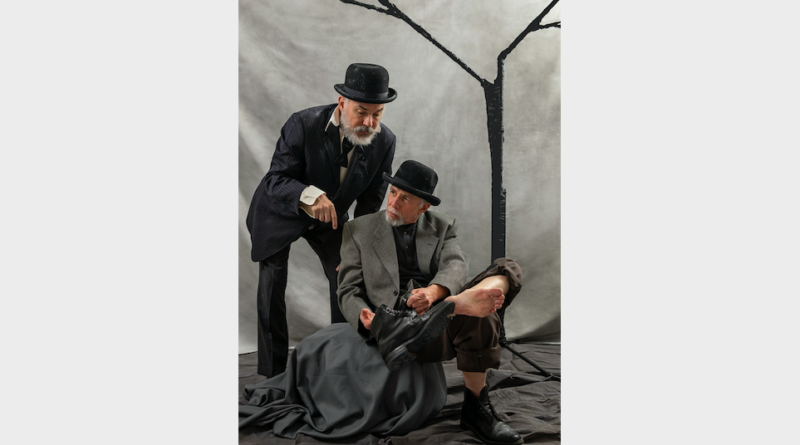INTERVIEW: Yiddish-language ‘Godot’ to open in Sweden
Photo: From left, Shane Baker and Michael Wex star in Waiting for Godot. Photo courtesy of Ronald L. Glassman / Provided by press rep with permission.
Waiting for Godot by Samuel Beckett is one of the most celebrated plays of the last 100 years. The show’s intentional abstraction allows for many different interpretations, with various theater companies and communities leaving their stamp on the story of two men waiting for … well, that’s the question. What exactly are they waiting for? Who is Godot?
This revitalized Broadway season brought the new play Pass Over, which is a creative updating of the narrative by Antoinette Chinonye Nwandu that speaks to issues of race, systemic racism, spirituality and friendship. A few years ago, the Druid Theatre Company presented the classic text at the White Light Festival at Lincoln Center. And now the Congress for Jewish Culture is taking a Yiddish-language translation of the play on the road, presenting their version at the Royal Dramatic Theatre in Stockholm, Sweden, this weekend. This will be the first time in the theater’s multi-century history that a Yiddish play will be performed on stage.
Performances for Waiting for Godot run Nov. 13-14, and seats are hard to come by. Two of the three performances have already sold out. Starring in the production is Michael Wex as Estragon and Shane Baker as Vladimir, along with Allen Lewis Rickman, Luzer Twersky and Nicholas Jenkins, according to press notes. The play will be performed in Yiddish with Swedish supertitles.
Recently Hollywood Soapbox exchanged emails with Wex as he prepared to travel to Sweden. Wex is a Canadian novelist, playwright, translator, lecturer, performer, and author of books on language and literature, according his official biography. Questions and answers have been slightly edited for style.
What are your thoughts before you leave for Stockholm for this exciting production?
They’re pretty much those of a newly appointed ambassador: an odd mixture of anticipation, excitement and just enough trepidation to keep the first two from levelling off. I’m not talking about fear, so much as the sort of heightened sensitivity you feel before stepping on stage for the first time in a part you’ve never played before — except that I’ve been feeling it for the last few weeks! The future of Yiddish doesn’t really rest on me or this production, but I think we’re all feeling like emissaries of an entire culture.
What do you love about Waiting for Godot as a play?
If there was ever a play that seems totally different, totally new, every time you read or see it, it’s got to be Godot. The lack of verbal and physical adornment, the constant call-backs and poking away at what can, in the end, be felt but not expressed, give it a freshness that has nothing to do with being up-to-date or mirroring current trends. It could be happening anywhere, at any time; its real subject matter lies far beyond anything that can be conveyed in standard dialogue or discursive language. Like life itself, Godot is easier to experience than explain.
Do you feel that performing this classic play in another language adds to its power? Does it change its interpretation?
Having been written in French by an expatriate Irishman, Godot can be said to have always been performed in another language. What we English-speakers think of as the play is already a translation, albeit by the playwright himself, who didn’t hesitate to make changes based on the language in which he was writing. I don’t know that translation adds to the play’s power so much as it broadens it by underlining the different ways in which inexpressibility can be conveyed.
How do you see the character of Estragon?
Someone with a need to be needed who is afraid that he isn’t.
What/who do you believe these characters are waiting for?
I’m in complete agreement with the author, who said, “I don’t know who Godot is.”
Is the creative muscle you use for writing similar to the one you use for acting?
Pretty much, though it tends to power different movements. Acting and writing fiction are different, but surprisingly complementary ways of not being yourself. While acting is more immediately physical, they’re both matters of inhabiting someone else. The major difference, at least for me, is that my acting usually involves someone else’s someone else, while my writing tends to focus on my own.
By John Soltes / Publisher / John@HollywoodSoapbox.com
Waiting for Godot, presented in Yiddish, will play Nov. 13-14 at the Royal Dramatic Theatre in Stockholm, Sweden. Click here for more information and tickets.

